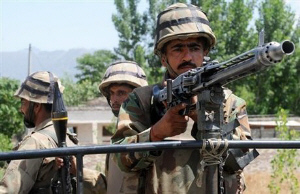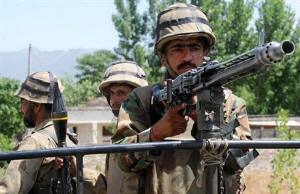Pakistan is willing to hold peace talks with Islamist militants if they surrender their weapons first.
 Pakistan is willing to hold peace talks with Islamist militants if they surrender their weapons first, Interior Minister Rehman Malik said Tuesday.
Pakistan is willing to hold peace talks with Islamist militants if they surrender their weapons first, Interior Minister Rehman Malik said Tuesday.
"We have received messages from banned outfits and militant organizations for reconciliation and we have conveyed these messages to our leadership," Malik told reporters in Quetta, the capital of troubled Baluchistan province.
Pakistan plays host to myriad Islamist militant groups, principally a Taliban-led insurgency in its northwest on the border with Afghanistan, but also a regional insurgency with separatist aspirations in Baluchistan.
Malik refused to disclose which militants he was talking about. Asked whether these reconciliation messages were coming from the Taliban or Baluch rebels, he replied: "It is purely confidential."
"The prime minister has also clearly stated that reconciliation is possible only with those who lay down their arms," he added.
"Reconciliation and talks are not possible when there is Kalashnikov in one hand. There is clear government policy that talks or dialogue would be held only with those who surrender their weapons," Malik said.
Pakistan is under mounting U.S. pressure to eliminate Taliban and al-Qaida-linked safe havens, in particular to launch an offensive against the Haqqani network considered the primary U.S. foe in eastern Afghanistan.
Closing ranks against the U.S. pressure at a conference uniting political and military leaders on September 29, Pakistan called for a new emphasis on reconciliation, saying "'give peace a chance' must be the guiding principle".
Washington says eliminating militant sanctuaries in Pakistan's tribal belt is vital to ending the 10-year war in Afghanistan and defeating al-Qaida.
But Pakistan has refused to open a new front against the Haqqanis and denies U.S. accusations of support for the al-Qaida-linked network.
Privately, security officials concede there are contacts, which they say are vital to securing any future peace in Afghanistan and to safeguarding Pakistan's perceived interests in countering Indian influence.
They also fear that fighting could unleash a backlash in bomb attacks that have already killed 4,700 people since 2007, on top of around 3,000 soldiers who have died in battle since 2001 when the country joined the war on terror.
Pakistan has launched numerous offensives against homegrown militants in the lawless tribal areas, but despite repeated claims of success Taliban insurgents have continued to pose a major security threat.
On Monday, the Pentagon said cross-border attacks emanating from Pakistan against U.S.-led forces in Afghanistan have increased since U.S. troops killed Osama bin Laden near the capital Islamabad last May.
"This summer, June-August, we did see an increase in cross border incidents," Pentagon press secretary George Little told reporters in an email.
U.S. soldiers in Afghanistan's eastern Paktika province told the New York Times that rocket fire had dramatically increased from Pakistani territory.
It was unclear if the fire, usually 107mm rockets, was the result of an emboldened insurgency, retaliation by the Pakistani military or some mixture of both, the Times reported Monday, quoting U.S. military officers.
There were at least 102 "close-border" attacks against three U.S. outposts in Paktika since May, compared to 13 during the same period last year, it said.
